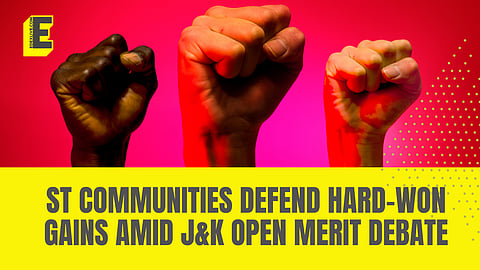

The recent demand by the unreserved population in Jammu and Kashmir (J&K) to review the New Reservation Policy has reignited a long-standing debate over affirmative action and its implications for social justice. While some argue that this reservation structure creates disparities and limits opportunities for the general category, reserved category students and activists offer a counter-narrative that highlights systemic discrimination and the need for continued affirmative action.
Representatives from the Gujjar-Bakerwal community, which comes under the Scheduled Tribes (ST)1 category and has held ST status since 1991, have raised concerns regarding the extent of reservations in the region, the ongoing open merit debate and the inclusion of the Pahari ethnic group in the ST category.
Historical context of Gujjar Bakerwal reservation
Amir Choudhary, Chief Spokesperson of the Gujjar Bakerwal Students Alliance, Jammu & Kashmir, highlighted the long struggle of his community for ST recognition.
“Our demand for ST status dates back to the early 1960s, but due to political interference, it was delayed multiple times. It was only after immense sacrifices and resignations from political leaders that we were granted ST status in 1991. However, at the same time, the Jammu & Kashmir government recommended ST status for the Pahari community. This was rejected by the Advocate General of India and the SC (Scheduled Caste)/ST Commission on the grounds that the Pahari community did not meet the criteria of a tribal group,” he explained.
Despite receiving ST recognition, the Gujjar Bakerwal community continues to face significant socio-economic challenges. “Only about 10% of our population is availing reservation benefits. More than 50% of our community remains illiterate, and we still lack access to basic amenities like roads, electricity, and water. Many of our people continue to live as nomadic groups, migrating between plains and mountains. Discrimination is also rampant — Kashmiri and Dogra communities often refuse to accept us as equals,” Choudhary added.
Controversy over Pahari reservation
The recent inclusion of the Pahari ethnic group under ST status has been strongly opposed by the Gujjar Bakerwal community. Choudhary outlined the sequence of events that led to this decision.
“In 2018, the then Mehbooba Mufti-led government, in alliance with the BJP (Bharatiya Janata Party), granted 4% Pahari-speaking people (PFP) reservation. This decision was made purely for electoral gains in the Pir Panjal region, where both Gujjars and Paharis reside. Later, the GD Sharma Commission was formed to identify backward classes and propose reservations. However, this commission operated behind closed doors without conducting any ground surveys," he said. He also alleged that upper castes groups such as Sharma, Verma, Gupta, Mahajan and even caste like sects, Syed and Khan were arbitrarily classified as ST.
In response, the Gujjar Bakerwal community organised mass protests, hunger strikes, and marches, including a Tribal Bachao March covering 1,500 - 2,000 kilometres on foot. “Despite our opposition, the BJP government went ahead with granting ST status to the Pahari ethnic group. We have since taken legal action against this move,” he stated.
Open merit debate: Data vs perception
With the implementation of the new reservation policy, a section of the population began advocating for the rationalisation of reservations, citing concerns that 70% of the region’s population falls under reserved categories while only 30% remains under open merit. However, Gujjar Bakerwal leaders refute this claim.
“We initially supported the demand for rationalisation, as we also believed that the inclusion of the Pahari ethnic group was unconstitutional. However, some elements within the movement started targeting the Gujjar Bakerwal community, falsely claiming that we monopolised reservation benefits. They spread misinformation that 70% of seats were reserved, whereas, in reality, there is no official data supporting this,” Choudhary asserted.
The ground reality
Showkat, a student from the Gujjar Bakerwal community, echoed similar sentiments, emphasising the community’s continued marginalisation despite reservations.
“Our people still lack basic necessities like housing and land. Until 2019, we had no political reservation in local governance. Representation in higher education and government institutions remains dismal. Unlike other states, J&K does not provide reservation in promotions for STs, further limiting our progress,” he said.
He also dismissed the 70% reservation claim, explaining that a breakdown of the data paints a different picture.
“If we go by the 2011 census, the Gujjar Bakerwal population has increased by around 25%. The total cumulative reservation for STs is 20%, meaning that even if our entire population were to benefit, we would still be underrepresented. The open merit category claims that they are only left with 30% of seats, but they fail to acknowledge that many of the reserved categories, such as RBA (Residents of Backward Areas), ALC (Actual Line of Control), and IB (International Border) categories, largely belong to the general population,” he argued.
The final word
The debate over reservations in Jammu & Kashmir remains deeply contentious. While the Gujjar Bakerwal community continues to struggle for adequate representation, the inclusion of the Pahari ethnic group under ST status has added another layer of complexity to the issue.
As political narratives shape policies, the question remains: Will reservations be used as a tool for genuine upliftment or as a mere political instrument for electoral gains? The answer, as the Gujjar Bakerwal community argues, lies in data-driven policymaking like the caste census that will bring out the reality rather than politically motivated decision-making.
